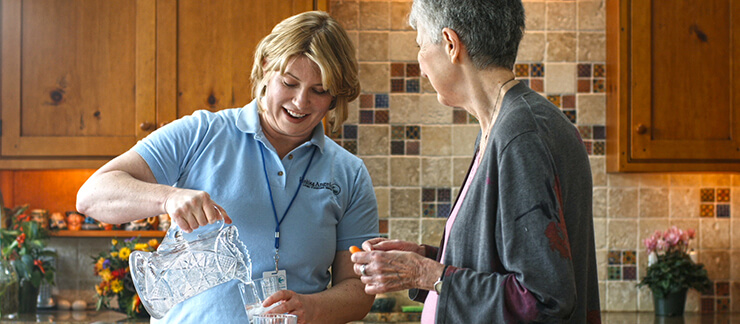
Part 2: Expert Advice When Caring for a Loved One with Alzheimer’s
This is article number two of a three-part series featuring direct advice from an experienced, tenured home care administrator. Be sure to check out parts one and three for specific care information for loved ones with dementia or Lewis body.
Alzheimer’s disease is a disease that affects the brain and is the most common form of dementia. In Alzheimer's, proteins form in the brain, which stop new neural connections from being made and significantly disrupts short-term memory. It is a progressive disease that will only get more difficult to manage. There is no cure for Alzheimer’s, although there are many ways to help a senior with the disease live more comfortably and independently for as long as possible.
Debra Desrosiers has spent over 14 years in the home care industry. She is a certified trainer and consultant in dementia and Alzheimer’s issues, and has volunteered with the Alzheimer’s Association for over a decade. She advises these seven ways to help a loved one with Alzheimer’s:
1. Talk to Your Loved One’s Doctor
Alzheimer’s is not a simple diagnosis. There are so many types of dementia, and it's vital you know the kind your loved one has. "Tell a doctor the signs you’ve seen,” advises Ms. Desrosiers. “Ask her what the warning signs are that you should be looking out for. Ask the doctor whether she can rule out other possible causes of your loved one’s symptoms, such as depression or reversible forms of dementia. Ask if it’s appropriate for your loved one to see a neurologist or geriatric brain specialist.”
2. Leave Visual Clues
As your loved one’s memory wanes, day-to-day life will get more difficult, but she should be able to live independently for a long time. Leaving visual clues around the house, such as post-it notes, can help jog your loved one’s memory. “I have one client whose house is covered in post-it notes to help her to remember where things are and what things she needs to do,” says Ms. Desrosiers. “She has a notebook where she writes down anything important that happens to her, like medical changes. She goes through the notebook every day to remind herself of things that are happening in her life.”
3. Make Things Easy for Your Loved One
Debra adds that gentle reminders will help her not to forget important tasks. “A medical planner with an alarm that goes off when it’s time take a pill can help her to remember her medication. There are lots of devices available online that can help people with Alzheimer’s carry out their day-to-day routine.”
4. Challenge Your Loved One
Keeping your loved one’s mind active helps to slow the advance of the disease. "If Mom's sitting watching TV all day, the connections in the brain are dying faster,” says Debra. "It helps to plan out different activities throughout the day, like brushing their teeth and getting dressed. This may not seem like much but working through the routine is keeping the mind active.” Sometimes your loved one may skip steps, so it can help to have someone around while she is doing the task. “Engage your loved one in discussions, visit an art museum, play hangman or a word game. If your loved one is using her brain, it’s helping her.”
5. Help Your Loved One Learn New Things
Learning new activities can be the ultimate challenge for seniors mentally. When your loved one is learning, she is forming new connections in the brain, which is helping to keep the brain active and fending off further deterioration. “Pretty much anyone can learn to paint,” adds Debra. “It keeps the mind active and creating something usually gives a huge boost to the self-esteem, which can be so important because seniors can start to feel like they aren’t useful or productive.”
6. Help Your Loved One Stay Physically Active
A lack of activity can lead to problems for other family members, reminds Debra. “When seniors aren’t active they tend to sleep more throughout the day and then they wake up and are active through the night. This can be very hard for family caregivers, who then have to disturb their own sleep to settle their loved one, which leaves them exhausted and leads to caregiver fatigue. If your loved one is active through the day, she should sleep better at night”.
7. Consider a Professional Caregiver
A professional caregiver can help you keep your loved one with Alzheimer’s independent and happy for as long as possible. A care provider can help to match you up with a caregiver who has experience working with seniors with Alzheimer’s and who knows what your loved one‘s needs, as well as potential warning signs of deterioration.
This professional can offer your loved one help with tasks around the home and provide support in carrying out her daily routine. This person offers companionship and will happily engage your loved one to help to stimulate her mind, whether that is by playing games, helping with a new or old hobby, or just conversing with your senior. The caregiver can accompany your loved one on walks, to make sure she is physically active but at the same time be watching out for any fall risks which might arise.
Perhaps most importantly, a professional caregiver can give you and the rest of your family a break from worrying, since you know that while the caregiver is with your loved one, she is in great hands.


